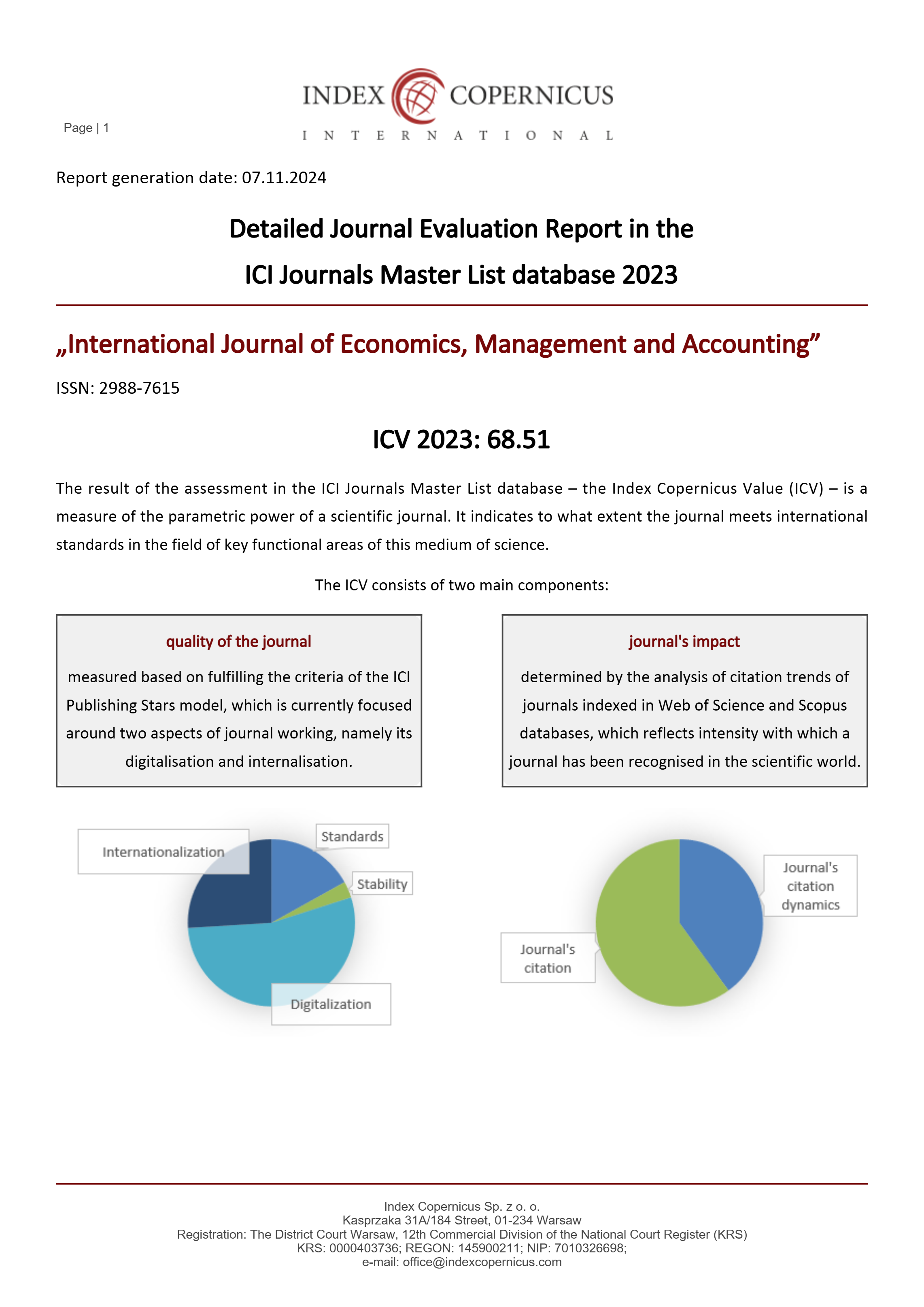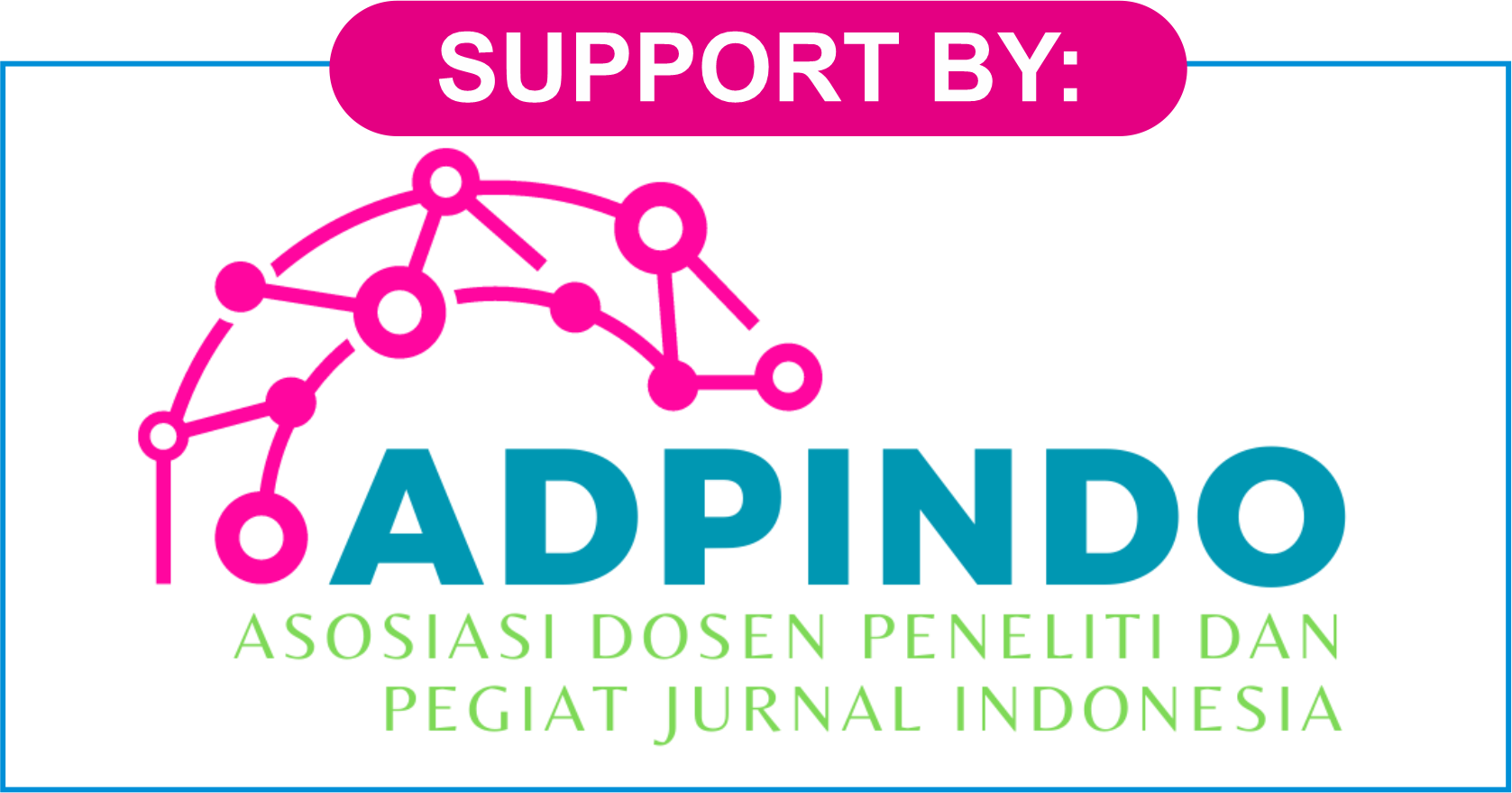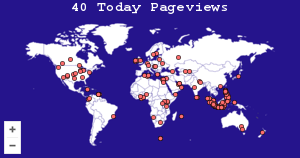The Effect of Motivation and Compensation on Teacher Performance Through Self-Efficacy: Case Study at SMKN 1 Sukabumi City
DOI:
https://doi.org/10.47353/ijema.v2i1.163Keywords:
motivation, compensation, self-efficacy, teacher performanceAbstract
This study aims to analyze the influence of motivation and compensation on teacher performance through self-efficacy at SMKN 1 Sukabumi City. This research method is quantitative with the type of explanatory research and causal research, and as many as 107 teachers at SMKN 1 Sukabumi City were used as research samples. The data was collected through Google Forms and analyzed using smartPLS version 4.1.0.0 with Outer Model, Inner Model, and Bootstrapping techniques. The results of this study show that: (1) Motivation has a significant negative effect on teacher performance (coefficient -0.217, t-statistic 2.090, p-value 0.037). This means that increasing motivation decreases teacher performance. (2) Compensation had a significant positive effect on teacher performance (coefficient 0.207, t-statistic 2.199, p-value 0.028). Increased compensation improves teacher performance. (3) Motivation had a significant positive effect on self-efficacy (coefficient 0.266, t-statistic 2.940, p-value 0.003). The higher the motivation, the higher the teacher's self-efficacy. (4) Compensation had a significant positive effect on self-efficacy (coefficient 0.314, t-statistic 3.861, p-value 0.000). The higher the compensation, the higher the teacher's self-efficacy. (5) Self-efficacy has a significant positive effect on teacher performance (coefficient 0.511, t-statistic 5.849, p-value 0.000). The higher the self-efficacy, the better the teacher's performance. (6) Motivation influences teacher performance through self-efficacy (coefficient 0.136, t-statistic 2.877, p-value 0.004). Self-efficacy is an important mediator with a contribution of 13.6%. (7) Compensation affects teacher performance through self-efficacy (coefficient 0.160, t-statistic 3.081, p-value 0.002). Self-efficacy is an important mediator with a contribution of 16%.
Downloads
References
Alam, S. (2023). Hasil PISA 2022, Refleksi Mutu Pendidikan Nasional 2023. https://mediaindonesia.com/opini/638003/hasil-pisa-2022-refleksi-mutu- pendidikan-nasional-2023
Alhidayatullah, A., Lestari, N. A., & Antony, A. (2023). Kepemimpinan dan Motivasi Kerja Dalam Meningkatkan Kinerja Karyawan. Jurnal Inspirasi Ilmu Manajemen, 1(2), 103-111.
Andrew, S., & Field. (1998). Self-Efficacy as a Predictor of Academic Performance in Science. Journal of Advanced Nursing, 27, 596–603.
Apipah, S., Putra, F., & Gazali, M. M. (2023). Pengaruh Motivasi dan Kepuasan Kerja Terhadap Kinerja Guru SMK Baitul Hamdi Boarding School Pandeglang Banten. CITACONOMIA: Economics and Business Studies, 2(1), 14–27. https://e-journal.citakonsultindo.or.id/index.php/CITACONOMIA/article/view/179
Azainil, A., Komariyah, L., & Yan, Y. (2021). The effect of principal’s managerial competence and teacher discipline on teacher productivity. Cypriot Journal of Educational Sciences, 16(2), 563–579. https://doi.org/10.18844/CJES.V16I2.5634
Çetin, F., & Aşkun, D. (2018). The effect of occupational self-efficacy on work performance through intrinsic work motivation. Management Research Review, 41(2), 186–201. https://doi.org/10.1108/MRR-03-2017-0062
Effiyanti, T., Sukirno, S., Widihastuti, W., & Retnawati, H. (2023). Confirming the Effect of Motivation on Teacher Performance in Elementary School: a Meta-Analysis. TEM Journal, 12(1), 519–528. https://doi.org/10.18421/TEM121-62
Fahmi, P., Sudjono, Parwoto, Supriyatno, Saluy, A. B., Safitri, E., Effiyaldi, Rivaldo, Y., & Endri, E. (2022). Work Stress Mediates Motivation and Discipline on Teacher Performance: Evidence Work from Home Policy. Journal of Educational and Social Research, 12(3), 80–89. https://doi.org/10.36941/jesr-2022-0068
Ghozali, I. (2016). Aplikasi Analisis Multivariete Dengan Program IBM SPSS 23 (8th ed.). Badan Penerbit Universitas Diponegoro.
Hamsal, Nurman, & Razak, A. (2023). Pengaruh Motivasi Dan Kompensasi, Terhadap Kinerja Guru PAUD Se-Kecamatan Tambang Kabupaten Kampar. Management Studies and, 4(1), 21–34. https://doi.org/https://doi.org/10.37385/msej.v4i1.1335
Kaldi, S., & Xafakos, E. (2017). Student teachers’ school teaching practice: The relation amongst perceived self-competence, motivation and sources of support. Teaching and Teacher Education, 67, 246–258. https://doi.org/10.1016/j.tate.2017.05.019
Keiler, L. S. (2018). Teachers’ roles and identities in student-centered classrooms. International Journal of STEM Education, 5(1). https://doi.org/10.1186/s40594-018-0131-6
Kemendikbud. (2020). Rencana Strategis Kementrian Pendidikan dan Kebudayaan 2020-2024. Kementerian Pendidikan dan Kebudayaan, 1–129. https://dikti.kemdikbud.go.id/
Kusuma Widjaja, M. E. L. (2021). Strategic Orientation and Human Resources Management in Public Sector Organizations in the Society 5.0 Era. Proceedings of the 18th International Symposium on Managemen, 18(1), 235–240.
Lestari, N. A., Sudarma, A., & Antony, A. (2021). The Determinants of Dividend Policy (an Empirical Study on Manufacturing Companies Listed on the Indonesia Stock Exchange 2016-2019 Period). JBTI : Jurnal Bisnis : Teori Dan Implementasi, 12(1), 23–36. https://doi.org/10.18196/jbti.v12i1.11761
Lubis, S. H. H., Purba, S., Siburian, P., & Sinaga, O. (2022). Pengaruh Efikasi Diri Dan Motivasi Kerja Terhadap Kinerja Guru Penggerak Angkatan 4 Kabupaten Mandailing Natal. Syntax Idea, 4(9), 1322–1330. https://doi.org/10.46799/syntax-idea.v4i9.1957
Maritasari, D. B., Setyosari, P., Kuswandi, D., & Praherdhiono, H. (2020). The effect of training and supervision on teacher performance through teacher competence as a mediating variable in primary schools. Universal Journal of Educational Research, 8(11 C), 105–112. https://doi.org/10.13189/ujer.2020.082312
Mbukanma, I. (2022). Investigating the Influence of Awards on Teacher’s Motivation Towards Performance: A Study of Selected Primary School in Delta State Nigeria. Journal of Educational and Social Research, 12(6), 246–259. https://doi.org/10.36941/jesr-2022-0160
Mulyaningtyas, B., & Soliha, E. (2023). Pengaruh Kompensasi dan Lingkungan Kerja Terhadap Kinerja Guru dengan Kepuasan Kerja Sebagai Variabel Intervening (Studi Pada Yayasan Pendidikan Setiabudhi Semarang). Darma Agung, 31(1), 677–687. https://jurnal.darmaagung.ac.id/index.php/jurnaluda/article/view/3066
Nurodin, I., Alhidayatullah, A., & Sudarma, A. (2023). The Role Of Leadership And Motivation In Improving Employee Performance. HBR Husnayain Business Review, 3(1), 43–49. https://doi.org/10.54099/hbr.v3i1.539
Saifullah. (2020). Determinasi Motivasi Dan Kinerja Guru Terhadap Kepemimpinan Kepala Sekolah Dan Kompetensi Profesional Guru (Studi Kasus Di SMAN Negeri 1 Kota Bima) Literature Review Manajemen Sumber Daya Manusia. Jurnal Manajemen Pendidikan dan iImu Sosial, 1(2), 600–621. https://doi.org/https://doi.org/10.38035/jmpis.v1i2.340
Sarkadi, Syarifa, S., & Casmana, A. R. (2020). The policy of education based on character values for the best quality of education is “an analysis of the zoning system policy imposed by the ministry of education and culture in Indonesia.” Universal Journal of Educational Research, 8(8), 3423–3429. https://doi.org/10.13189/ujer.2020.080816
Subiarto, S., & Wakhudin. (2021). The Role of Teachers in Improving The Character of Students. Dinamika Jurnal Ilmiah Pendidikan Dasar, 13(2), 71–75. https://doi.org/10.30595/Dinamika/v12i2
Sugiyono. (2019). Metode Penelitian Kuantitatif, Kualitatif dan R dan D. Alfabeta.
Sulastri, L., & Uriawan, W. (2020). Pengaruh Lingkungan Kerja, Motivasi Dan Efikasi Diri Terhadap Kinerja Pegawai Di Era Industri 4.0. Komitmen: Jurnal Ilmiah Manajemen, 1(1), 43–49. https://doi.org/10.15575/jim.v1i1.8288
Syam, H., & Saman, A. (2022). The Effect of Innovative, Creative Characteristics and Principal’s Commitment on Teacher Performance with Motivation as an Intervening Variable. In Asian Journal of Applied Sciences (Vol. 10, Issue 3). www.ajouronline.com
Tang, S. Y. F., Wong, A. K. Y., & Cheng, M. M. H. (2016). Configuring the three-way relationship among student teachers’ competence to work in schools, professional learning, and teaching motivation in initial teacher education. Teaching and Teacher Education, 60, 344–354. https://doi.org/10.1016/j.tate.2016.09.001
Tang, S. Y. F., Wong, A. K. Y., Li, D. D. Y., & Cheng, M. M. H. (2020). Millennial generation preservice teachers’ intrinsic motivation to become a teacher, professional learning, and professional competence. Teaching and Teacher Education, 96. https://doi.org/10.1016/j.tate.2020.103180
Tungkasamit, A., Silanoi, L., Nethanomsak, T., & Pimthong, P. (2014). Evaluation of School Activities for Developing the Desired Characteristics based on Sufficiency Economy Philosophy: A Project Report. Procedia - Social and Behavioral Sciences, 116, 541–546. https://doi.org/10.1016/j.sbspro.2014.01.255
Downloads
Published
How to Cite
Issue
Section
License
Copyright (c) 2024 Empri Supriatno, Darmo H. Suworyo, Asep Hikmat, Munandi Saleh

This work is licensed under a Creative Commons Attribution 4.0 International License.











